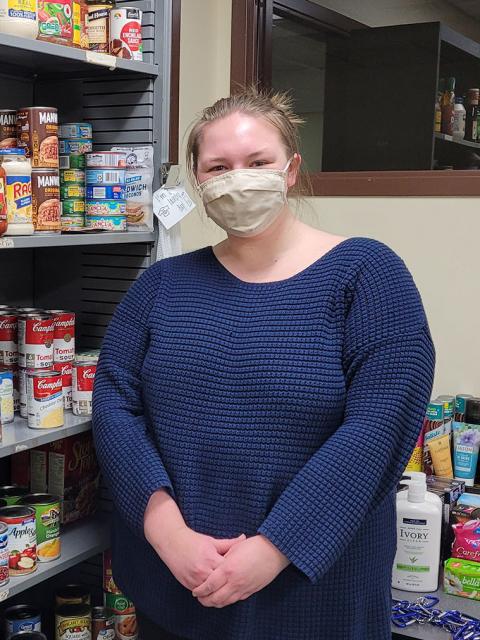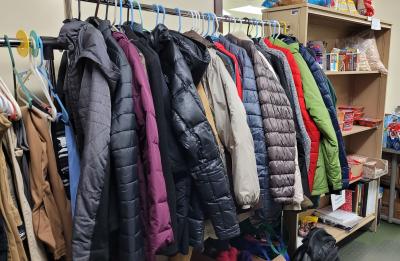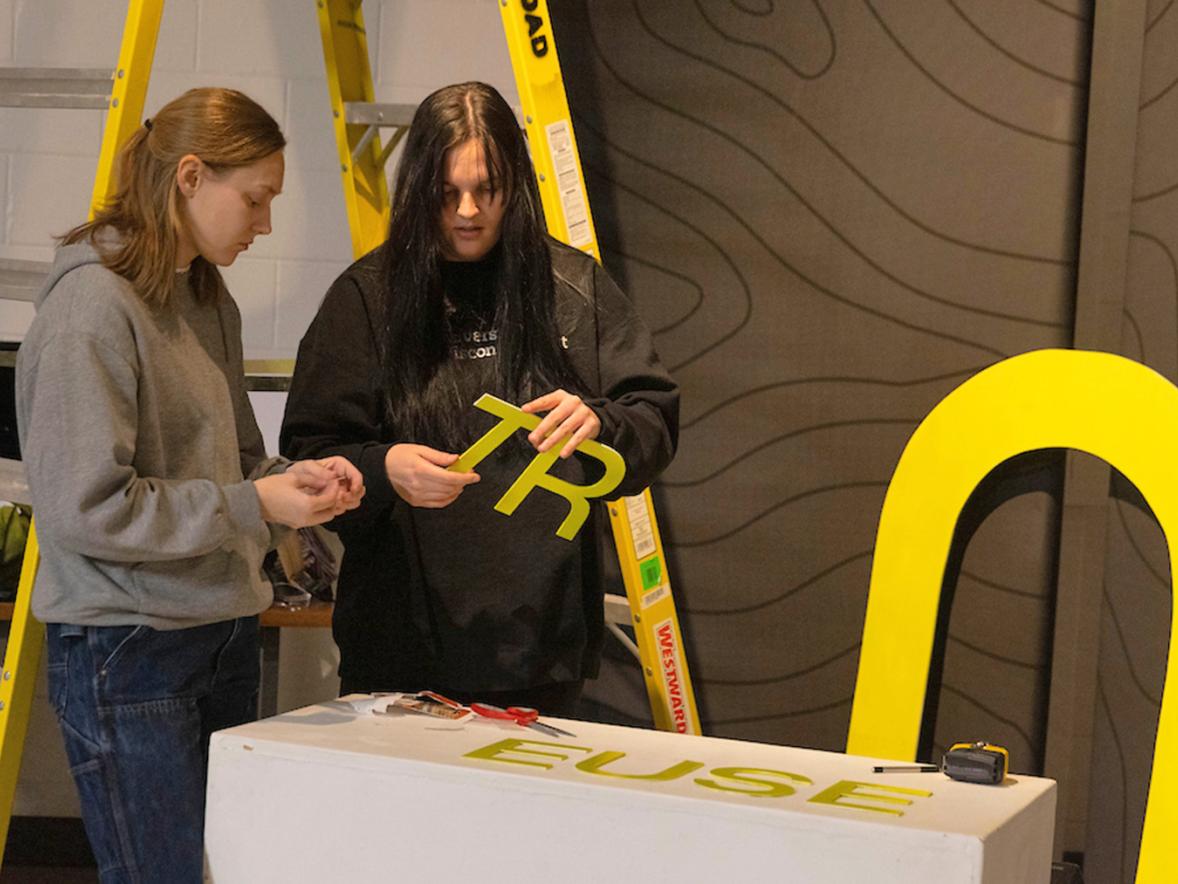A December 2018 report by the Government Accountability Office found that food insecurity impacted nearly two million college students across the nation. Two years later, as the pandemic touches every aspect of our daily lives including access to basic needs, the number of students facing food insecurity has more than tripled.
About 19.7 million students nationwide are attending college this academic year. More than six million are estimated to experience food insecurity.
“This is one-third of all college students,” said Sarah Snyder, University of Wisconsin-Stout’s Resident Life coordinator.
A Helping Hand for Blue Devils
Recognizing an unmet need, Snyder began Helping Hand Food+ Pantry, an on-campus pantry open to all university students. Friday, April 2, marks its two-year anniversary. In 2020, it served 65 students regularly.
Helping Hand offers nonperishable and perishable food items, including easy microwavable meals. It offers a range of helpful products like hygiene items, including deodorant, feminine hygiene products, bodywash and shampoo; school supplies; career clothing; and winter weather wear.
Helping Hand is staffed by student volunteers and is open limited hours Monday through Thursday. It is on the lower level of the Administration Building.
Students with questions or wishing to schedule an appointment may email foodpantry@uwstout.edu. Helping Hand offers confidential registration through a one-time form. Information can also be found on the Stout Helping Hand Facebook page.
Anyone wishing to support students’ needs through Helping Hand may give an online donation to the University Foundation or drop off nonexpired goods during open hours. Groups wishing to do food drives and looking to give the most-needed items can email foodpantry@uwstout.edu.
Monetary donations allow Helping Hand to purchase more food per pound from Feed My People Food Bank and allow the pantry the flexibility to buy in bulk the items that are needed most, said Sandi Scott, Dean of Students.
Supporting students in need
Snyder, who serves as Helping Hand coordinator, thinks access to nutritious food should not be a roadblock to getting an education. “Providing this resource helps our students focus on their academics instead of worrying about where their next meal is coming from,” she said.
Jamee Bastman, a senior in industrial design from Ironwood, Mich., volunteers at Helping Hand. A member of the Honors College, Bastman volunteered with Girl Scouts and the National Honor Society in high school, has helped with Meals for Heart on campus and volunteered at the elections this past year during COVID-19.
Bastman loves to build a sense of community. “Community means helping one another. I think our country is very individualistic, and it’s very important to reach out and help wherever we’re needed,” she said.

“We also need to reduce this stigma that everyone who goes to college has the means to live well. I have friends who are working two jobs and still can’t afford to eat well. Anyone can be in any type of financial situation at any time,” Bastman said.
As of Feb. 15, 3,842 students at UW-Stout had applied for federal aid for the 2021-22 academic year, 104 more than at this same time last year.
“FAFSA’s for admitted students are up a bit from the previous year, indicating that students and families are applying early to receive the best financial aid package possible, as soon as possible,” said Beth Boisen, director of Financial Aid. “This indicates a growing need for support.”
Bastman also thinks there are students who bypass Helping Hand’s services, believing there are other students more in need. “We are open to every student,” she said.
“And there are still students who don't know we exist,” Snyder added.
Bastman thinks one solution to boost students’ awareness is to make sure faculty and staff know about the food pantry as well.
“At the start of each semester when professors hand out their curriculum, they often share a list of campus resources available to students. Helping Hand is a resource they can all add to that list,” Bastman said.
Other community resources

Helping Hand has information on free local meals and health care. It also has vouchers for local produce stops like KwikTrip, available to registered students. And it provides information about SNAP, the Supplemental Nutrition Assistance Program, and its benefits for eligible students.
The Stepping Stones Food Pantry, a community pantry, is also available to students and low-income residents of Dunn County. Serving more than 1,600 patrons a month, no one is turned away. As walk-ins are not permitted at this time, patrons are welcome at curbside pickup.
Stepping Stones is east of campus at 1602 Stout Road in Menomonie. The Dunn County Transit has bus routes to Stepping Stones, and students ride for free with their UW-Stout ID. For questions or information, email foodpantry@steppingstonesdc.org.
Tuesday’s Table is a food assistance program offering free meals-to-go. Meals are available for pick-up every Tuesday from 5 to 5:45 p.m. in the St. Joseph’s Church parking lot at 910 Wilson Ave. in Menomonie.
Previously, Helping Hand was in the University Services Building and then on the fourth floor of Bowman Hall with the Counseling Center. “Moving is always an adventure, but we've settled into our new space in the Admin Building,” Snyder said. “It's nice to have a space just for Helping Hand.”
Snyder plans to expand Helping Hand’s resources and outreach programming in the future.
Pantry visits are limited to one person at a time, for both student privacy and to allow safety following campus COVID-19 guidelines, with the exception of roommates who may come together. Masks are required, and cleaning and sanitizing occurs after every visitor.






